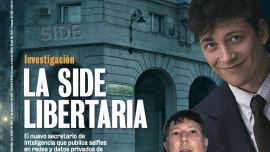Whatever might happen in Argentina, there is always a raging national conversation that never dies down. It’s a buzz that hits every issue and can often turn noxious, verging on ugly.
It's no different now that the coronavirus is here. President Alberto Fernández, polls show, is highly popular. But that doesn't mean that the critics will refrain from bashing the left-leaning Peronist president. Fernández has announced that Argentina's lockdown will continue until at least May 10. Restrictions are gradually being eased in phases, but activity is far from back to normal. The president announced last Saturday night that the lockdown will continue to be especially strict in big urban areas (Buenos Aires City, Greater Buenos Aires, Cordoba and Rosario). But the president added that children would be allowed to go out briefly daily with their parents for the first time since the lockdown was first put in place on March 20.
Blink. What ensued was a moment of elation for infants, followed by confusion. The notion that kids would finally be allowed out prompted what looked like a misunderstanding. Eventually four provincial governments (in Buenos Aires City, Buenos Aires Province, Cordoba and Santa Fe) said they had decided that children must continue staying in. The president then said that it had “slipped his mind” to specify that local authorities had the last word on easing the rules of confinement for children.
Immediately the buzz was that the president and the provincial governments are no longer in agreement on how to manage the shutdown. Fernández has said that people could not live locked up forever. Three of the provinces that refused to ease restrictions (Buenos Aires Province, Córdoba and Santa Fe) are Peronist, yet Buenos Aires City is ruled by Mayor Horacio Rodríguez Larreta, a prominent member of the opposition centre-right coalition Juntos por el Cambio.
Still, all four officials (including progressive Kirchnerite Buenos Aires Province Governor Axel Kicillof) issued a joint statement despite their differences. There was speculation that the president was eager to give some good news to the population, which is backing his management of the crisis, and that he was leaving the bad news (no, kids can't go out) to the mayors and governors. Rodríguez Larreta quickly underlined that coronavirus cases in the capital are growing and restrictions can’t be relaxed. Buenos Aires City, a centre-right bastion, re-elected Rodríguez Larreta last year, but he is under pressure. Allegations that the City paid too much for expired face masks prompted the resignation of two officials. The municipal government said it had moved quickly to cancel the purchase when it realised what was going on. But the negative headlines and the difficult questions about the potential scandal have not gone away.
The national conversation can change like a semi-retired office worker toying with his remote control in quarantine. The president has reflexes, sure, but he often pauses before making a decision, creating a momentary vacuum that leaves room for misinformation to viralise. News that authorities were planning to release prisoners to avoid the spread of the virus in jails came after an ugly riot in one of the main prisons in Buenos Aires City. The opposition pinned the idea of placing some prisoners under house arrest for health reasons on the national government.
Angered, the president eventually said that the Executive has no power to decide the fate of prisoners over judges and that he does not favour the use of presidential pardons. In some Buenos Aires City neighbourhoods residents banged pots and pans on Wednesday night against the release of prisoners from overcrowded jails in the middle of an epidemic. Rodríguez Larreta, who has avoided criticising a popular president, said he was outraged by what the opposition is calling a government-sponsored plan to place dangerous convicts under house arrest. Some members of the ruling coalition also made a point of blasting the judges approving releases. Lower House Speaker Sergio Massa, once a fierce critic of Kirchnerismo, said that judges could face impeachment as he met with a group of victims.
Fernández and Buenos Aires Governor Axel Kicillof insist that there is no national government plan behind the releases. The federal government counted 324 prisoners that had been released for health reasons, while the opposition claims at least 2,000 inmates have also been placed under house arrest in Buenos Aires Province.
Confusion also raged on another front. Argentina said it was pulling out of future free-trade accord negotiations in the Mercosur trade bloc, which includes Brazil, Paraguay and Uruguay. Fernández is now downplaying speculation that the death of Mercosur is imminent. The president also scrambled to get on the phone with Chile President Sebastián Piñera, after a formal diplomatic complaint about his public support for centre-left opposition politicians in the neighbouring country.
Controversy has also hit Congress where the ruling Frente de Todos coalition is poised to table a wealth tax bill, which is fiercely opposed by lobbies. The Supreme Court threw out a request by Vice-President Cristina Fernández de Kirchner, the head of the Upper House, to rule if the Senate can meet virtually for sessions. Justices said the Senate had the prerogative to decide its own rules and regulations. Fernández de Kirchner celebrated the decision, saying it effectively means that laws approved in future virtual sessions will not be able to be challenged in court (though some legal experts say otherwise). Caught up in the middle of this controversy is the tax, sponsored by the Kirchnerite wing of the ruling coalition, which would hit millionaires. Opposition lawmakers are now pushing for Congress to hold sessions normally (or as normal as possible in a pandemic).
All this talk of a wealth tax appears to have frayed the nerves of the lobbies and the fat wallets that fuel them. Critics are disturbed by the president's high popularity and a potential new tax. Agitation and la grieta, Argentina’s famous political rift, has returned.
On Wednesday, President Fernández abruptly sacked the head of the powerful ANSES social security agency, Alejandro Vanoli. The outgoing official was shown the door after arguing with Cabinet Chief Santiago Cafiero amid accusations of inefficiency, according to reports. ANSES, which manages a huge social welfare coffer, recently came under fire when thousands of retirees were forced to form long lines outside banks in the middle of the lockdown to collect their pensions. The agency was also criticised for problems related tto the payment of a special emergency family bonus to eight million people.
The sacking at a key agency, controlled by the Kirchnerite wing of the government, has the whiff of a Cabinet reshuffle. And it could be the first sign of a power struggle in the complex ruling Frente de Todos coalition, even though a CFK loyalist has been named to the post.
























Comments